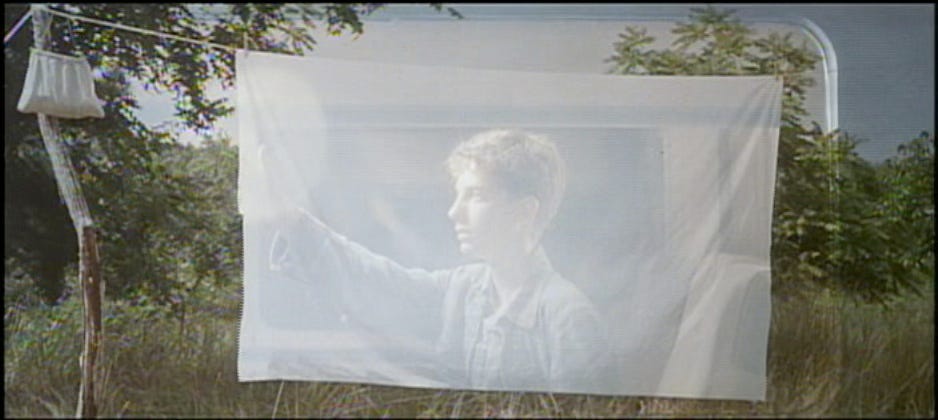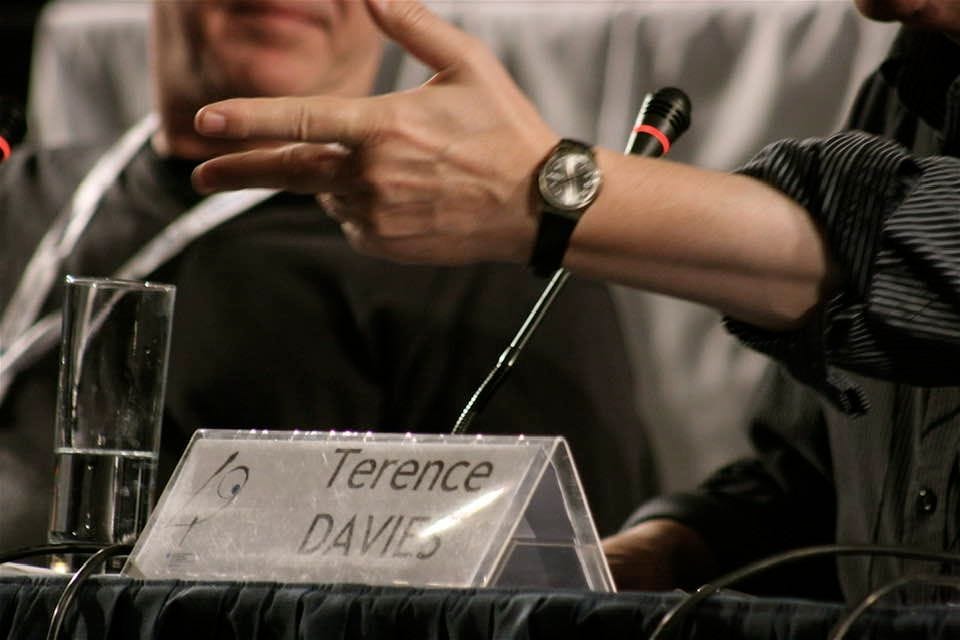A teenage boy named David, face dark with sorrow, boards a night train sometime after World War II, and looks out the movie-screen-shaped window into the night and remembers growing up poor in the gorgeous yet stifling prewar South in a matriarchal, fundamentalist family. While Terrence Davies' film never attains the voluptuous, loving perfection of his earlier memory pieces about growing up in Liverpool, Distant Voices, Still Lives and The Long Day Closes, The Neon Bible is rich with heart-stopping moments of what we have come to recognize as his fashion of eloquent visual beauty. There's also a raw, affecting star turn by Gena Rowlands as David's Aunt Mae, a faded chanteuse and indefatigable free spirit.
Davies moves freely from the deeply serious to the utterly frivolous in an hourlong conversation, coursing across the history of seventeenth-century Dutch painting, Catholicism versus fundamentalism, how books should be adapted, how a director might capture the American South when he grew up in Liverpool, as well as the grandeur of Doris Day (who he says he grew up wishing he could become) and the bitchy delivery of Eve Arden.
A pale, silver-haired imp, Davies is a charming conversationalist, speaking adoringly in his distinctive Liverpudlian accent of anything that catches his fancy. But anything that does not—particularly the work of other filmmakers—leads to a dour downward glance and an anxiety to move back to the work at hand: The Neon Bible, his often moving adaptation of a novel by the late John Kennedy Toole.
“Photographs are really so sad, somehow."
One impressive set piece finds a tent circuit preacher preparing to go onstage and muttering to himself about the flock he's fleecing. Davies opens the scene up to encompass the testimony of the believers and how some, particularly David's unstable mother (Diana Scarwid), are deeply moved by the man's words. To tersely and effectively show that the preacher is a charlatan, but then to demonstrate the nature of belief as being apart from the messenger, is a moving moment.
"I'm glad you said that, because I was castigated by one critic from not being accurate and that's where the film fell down and began to fall apart," Davies says. "When I wrote it, I could only say that's what I saw from the book. When people who've grown up in America say that's not accurate, I can't argue the point, I didn't grow up with fundamentalism, I grew up in Liverpool with Catholicism."
Davies says he expected people to find him a bit unusual when he arrived on the set of The Neon Bible in Georgia. "They expected me to be a bit strange, but I am, of course, aren't I? I'm English!" He laughs. "People expect me to be so serious, but I do like a good giggle now and again."
Rather than laughter, abiding sorrow is the constant in Davies' films. There are moments in his work where the images pulse with color, rigid yet magnificent compositions (here in Panavision) and a rich use of shadow that only the greatest painters achieve on canvas. There's a touch of Edward Hopper in the rural South of The Neon Bible, but Davies prefers older touchstones. "I think probably my favorite is Vermeer. It's significant that he lights from windows and I light from windows all the time. I suppose it represents some deep psychosis that I'd rather not know!" He laughs a hearty laugh. "Actually, the darkness [in The Neon Bible] would be from [the 17th century Dutch painter] Jacob van Ruisdael, some of the landscapes. For 'Long Day Closes,' we studied the light in 'The Anatomy Lesson' that just goes from black to brown to dark to black! There's even Turner, the Venetian paintings, just bands of color, staggering, that are in the Tate. The Venetian paintings are stunning, because they're just about light, fifty years before the Impressionists. But I don't know very much about painting, I came to it very late. Vermeer would be my absolute favorite, because of the quality of the light. Natural light falling through a window, there's something ravishing about it." He pauses. "It's just ravishing!"
Davies describes "Vile Bodies" as a dark tale of murder among gay men
in Manhattan's art world, combining the violence of Dennis Cooper
with the humor of All About Eve.
He grins madly and waits for the next question. Besides the features and three shorts that took a decade to finish, Davies also wrote a messy, dark novel, "Hallelujah Now." Why did his career as a writer-director take so long to arrive? "I wanted to be an actor and writer. I don't know where the novel came from, but I just needed to write it. I still write quite a lot of prose. I have a book I'm doing for Heinemann about how I came to the cinema, but I don't think I'll write another. When I go abroad, I don't take photographs, I write about the places. That's how I fix them in my mind. Photographs are really so sad, somehow."
Will the elliptical, memory-drenched style he's developed remain a constant? Will there ever be any long, bantering telling of tales by the characters? "In the new one, that's precisely what I've done." He describes "Vile Bodies" as a dark tale of murder among gay men in Manhattan's art world, combining the violence of Dennis Cooper with the humor of All About Eve.
"Because you know their wit is very mordant and people from New York are very sharp, there has to be that [three rapid finger snaps]. It may not be cut that way. There's one sequence where there are lots of these very quick exchanges, but it's done in a long track. I think the style, my style, is basically meditative, but within that, it might be interesting to have dialogue given very, very quickly. There are times you need to [snap, snap], you hear that banter, but you might see just their backs."
Is this stylistic excursion coming anytime soon? "I've got to finish the script," Davies says. "I only ever do two drafts, but the film takes a year to write. Sometimes sequences come fully formed. Other times it's a wisp of dialogue or a camera movement. It works by accretion over a long period. I need to get the correct structure and everything will follow. And the transitions have to be seamless. If I can't get the transition right, then I can't write the following sequence. I just can't. I write in longhand anyway. I wouldn't feel I had written anything otherwise." He folds his hands in his lap, shakes his head, awaits a further topic.





